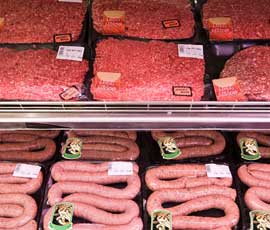Consumers unaware of GM animal feed use, study shows

Consumers are generally unaware that British farmers use imported GM maize and soya as animal feed, a new study has found.
Once made aware of its use, they typically considered that products from animal-fed GM feed should be labelled, according to the study commissioned by the Food Standards Agency.
The study found that two-thirds of consumers wanted products from animals fed on GM ingredients to be clearly labelled.
But only 2% of those polled mentioned spontaneously that they looked for information about GM content when buying products for the first time.
There was a slight preference for labelling indicating the presence of GM, rather than labelling indicating the absence of GM.
The study was commissioned by FSA to inform discussions within Europe about GM labelling and to ensure the UK’s public views were understood and represented.
Research agency Define interviewed 1,467 people between June and September last year for the report by the food watchdog on consumers attitudes to GM food labelling.
The Agricultural Biotechnology Council (ABC) welcomed the research, but said it highlighted there was still a lot of confusion among consumers over the use of GM in the UK.
ABC chair Julian Little said: “This research from the FSA confirms that only a small minority of one in fifty consumers actively look for GM information on labels, and studies have shown that most people do not actively avoid GM-labelled foods, but are more interested in their price and quality.”
All those involved in food production and distribution have a role in providing factual information to consumers on GM and other forms of agricultural technology, added Dr Little.
“Giving UK consumers greater confidence in the science and safety of agricultural technologies will allow them to make an informed decision on the future role of such innovations in the UK.”
In the EU, if a food contains or consists of genetically-modified organisms (GMOs), or contains ingredients produced from GMOs, this must be clearly labelled on the product.
Products such as flour, oils and glucose syrup have to be labelled as GM if they are from a GM source. But products produced with GM technology, such as cheese produced with GM enzymes, do not have to be labelled.
And products such as meat, milk and eggs from animals fed on GM animal feed do not have to be labelled.
DEFRA secretary Owen Paterson, who has backed introducing GM food production in the UK, said in December: “There isn’t a single piece of meat being served (in a typical London restaurant) where a bullock hasn’t eaten some GM feed. You know, large amounts of GM products are used across Europe.”
But the findings of the study suggest there is still a lot to do to educate the British public about the provenance of their food, say anti-GM campaigners, who have long campaigned for clearer labelling of products derived from GM ingredients.
Peter Melchett, policy director of the Soil Association, said: “These research findings are a major blow to Owen Paterson’s GM policy. The FSA figures show a large majority of consumers believe GM food labelling is important.”

